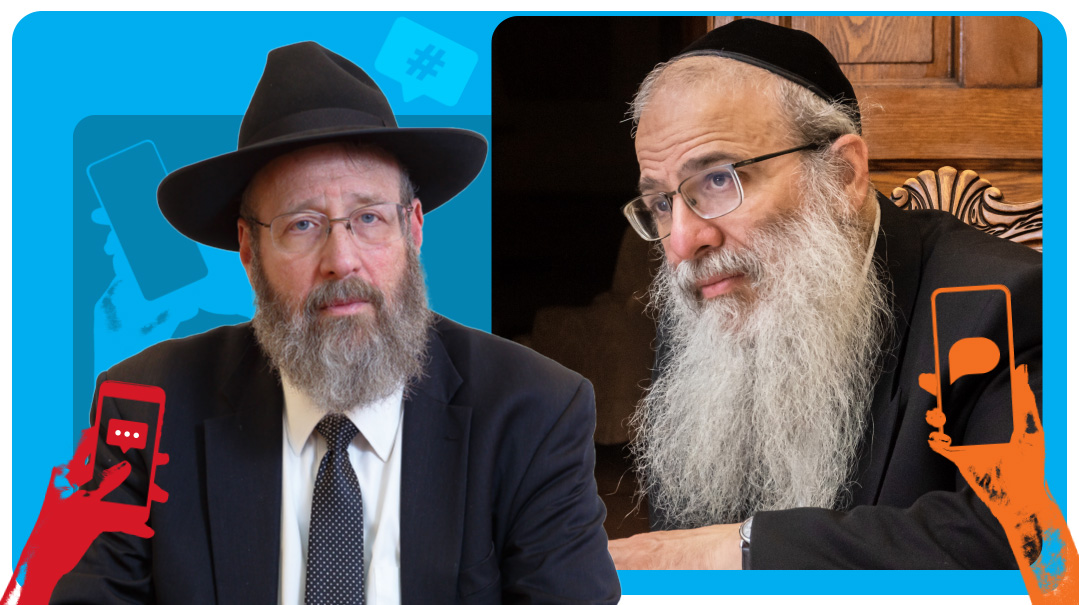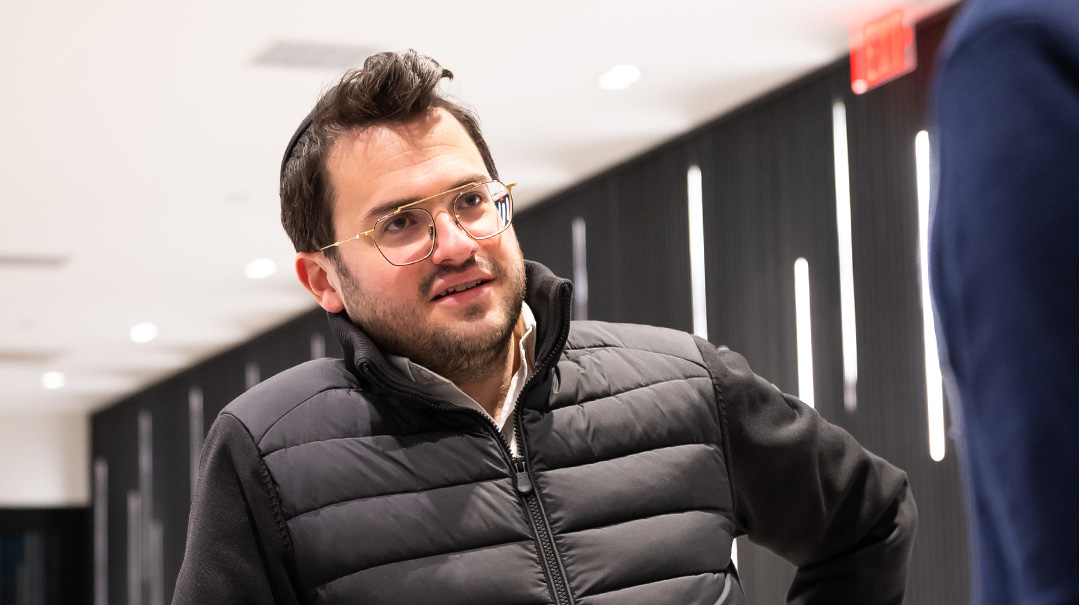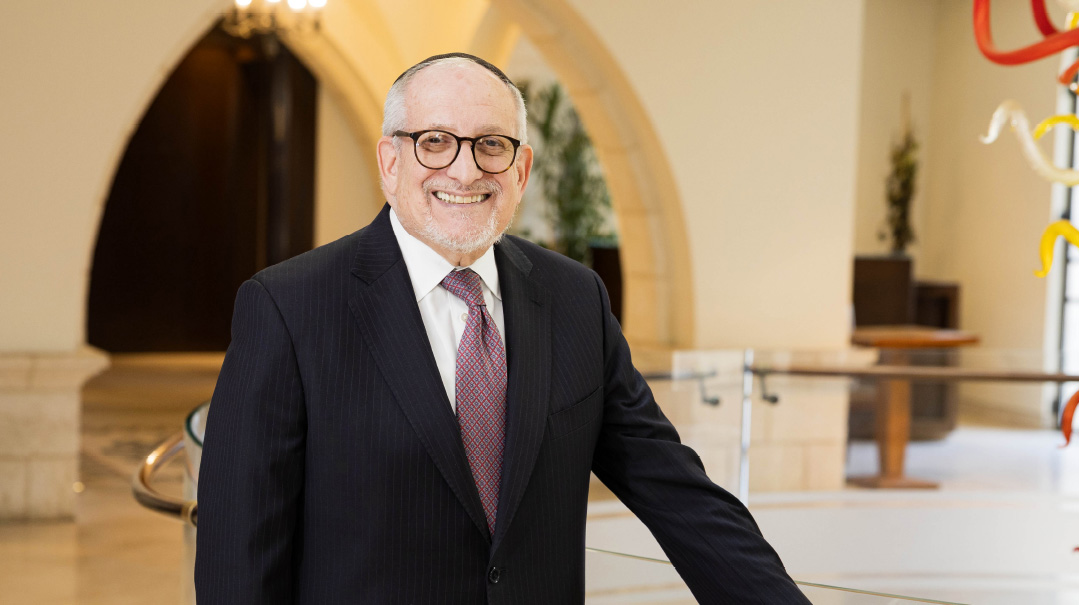Corrosive Connection

Rav Sholom Kamenetsky and Rav Aaron Lopiansky offer insight and advice about technology today

Photos: Meir Haltovsky, Elchanan Kotler
IN today’s murky world of skewed morals and eroded boundaries, so many of us crave the clarity of immovable black-and-white principles. Those principles are all the more essential when it comes to our engagement in the digital sphere. But many frum Jews find they do need to be connected and available on various digital platforms. Black and white is an easier paradigm, but gray is where many of us live. How do we maintain our unbending values amid the gray? How can we understand, define, and set limits in a digital world strewn with risks and pitfalls? And how can we counter the lure of a technological movement that exploits some of humanity’s most basic needs for its own selfish gains?
As tens of thousands of women gear up to attend the massive Nekadesh event revolving around this very issue, Rav Sholom Kamenetsky, rosh yeshivah of the Talmudical Yeshiva of Philadelphia, and Rav Aaron Lopiansky, rosh yeshivah of the Yeshiva of Greater Washington, share their wisdom and guidance
Social media presents a certain attraction, a lure that quickly becomes irresistible. Is this pull to constantly be connected to a large social network a new phenomenon, or is it rooted in a deep, innate human need?
Rav Lopiansky
Humans are social beings; that’s something that’s been part of us since sheishes yimei bereishis. (Adam, of course was created alone, yet, as the pasuk itself says, “lo tov heyos ha’adam l’vado — it was not good for man to be alone.” See also Rambam Hilchos Deios, 6:1). Our desire to interact with society is not merely a reality we must contend with; on the contrary, it is a positive quality, even a vital one. Chazal speak strongly of the importance of not being poresh min hatzibbur. Attaching oneself to a unified social environment is that valuable.
Social media has stepped into what is an essentially positive dynamic and destroyed it. It has created an imagined necessity to constantly be engaged in rapid-fire social interaction with the desperate sense that, unless I am constantly posting, or responding to posts, I cease to exist.
More specifically, three factors contribute to the “unhealthy” nature of social media versus the “healthy” character of natural human socializing.
The first is that “healthy” socializing demands autonomous decision-making. It must be up to you to decide when to socialize, how to socialize, and with whom you socialize. Exposing yourself to a world where that freedom of choice is robbed from you places you well within “unhealthy” territory.
Second, overindulgence in a healthy practice quickly transforms it into an unhealthy one. Eating is a perfect example. You must eat to survive — it’s that vital — but once you reach a certain point, the eating itself can harm you. It’s the same thing here. Social media allows for endless connectivity, well beyond the healthy and vital quantity of a necessary social life.
Third, a core factor in the original idea of social life is the “human” component. It’s the being in the presence of a fellow human that provides the warmth, and the comfort, that is so basic to our nature. Social media doesn’t provide that; what it offers is a synthetic substitute. Operating in a space where the people we feel close with aren’t real people is very unhealthy indeed.
Rav Kamenetsky
The need to communicate is a basic part of human nature, this is certain. But social media has manipulated that need on multiple levels.
There is an incredible Gaon in Mishlei that seeks to understand humanity’s pull toward laitzanus, the mindless pursuit of trivializing and belittling all that is holy — a pursuit that offers no tangible benefit whatsoever. The Gaon explains that whenever someone performs a mitzvah, that very act creates a ruach that thirsts for yet another mitzvah. And the same goes for aveiros. When someone commits an aveirah, a ruach tumah, a spirit of impurity, is created — which in turn craves another aveirah. Laitzanus might not provide any material gain, but once it begins, the thirst for more just grows stronger and stronger and stronger.
What we are seeing with social media — that obsessive need to share, post, comment on posts being shared, and then respond to those comments in return — is very much the words of the Gaon playing themselves out in real time and at an incalculable velocity. This is a partial explanation for the phenomenon of today’s social media-crazed world.
A different issue at hand is the imagined need to constantly showcase. This too taps into a very inherent part of human nature. There’s a fascinating insight said in the name of an early Acharon known as the Mahari Kasuto, quoted in the hakdamah to the second volume of the Ketzos Hachoshen. There, the Mahari Kasuto is quoted as saying that “one can go up to Shamayim and see the greatest treasures in the entire universe, yet he will have no pleasure from that sight unless he can share what he saw with another human being.”
Humans love to share experiences; this is a fact of life. But the need to share step-by-step, live footage of every one of life’s experiences is a distortion of this need that has been exploited by social media.
In much of today’s business world, certainly the world of goods and services, social media has become a basic norm. Potential clients, customers, and consumers all expect to be able to find products on the various digital platforms, and many business owners have found that they must meet those expectations in order to succeed. But how can we embrace a reality that is inherently harmful? Are there any working strategies that can allow for a balanced medium of “healthy social media”?
Rav Kamenetsky
Healthy? Fully healthy? I don’t believe that’s possible. Social media is an inherently unhealthy creature. If a platform could be limited to business purposes only, to advertise a product or a service, then that could be considered healthy. But no social media platform is limited to that context, and, therefore, it is hard to call any form of rapid-fire messaging “healthy.”
Rav Lopiansky
The answer to this question will vary based on the community and its prevailing hashkafah. There are kehillos that take a stance that even a little is too much. No social media is allowed — period. If that position works in that kehillah, then that’s wonderful. But if it doesn’t, then the regulations implemented should be tailored to meet the level that matches the community’s standard.
That’s speaking from the perspective of communal leadership.
On a personal level, as involved as someone might be in a particular passion or interest, people have the ability to take a step back and assess themselves objectively. Take smoking for example. Many have been highly addicted to smoking and succeeded in quitting — because they found those moments of quiet reason when they were able to evaluate their situation and make a sound decision.
The same dynamic applies here. Social media can be the subject of fierce obsession, but that doesn’t preclude our ability to think rationally. Using honest evaluations and well-informed priorities, we have the ability to properly assess what we’re capable of sacrificing on.
That is the first step. The second step must be that whatever realization you come to, it must be backed up with a mechanism to enforce it. That might mean turning off your phone for an hour a day. It might mean three hours a day. Whatever it is, you know your capabilities, and that knowledge should be recognized and applied practically.
For years, rabbanim, mechanchim, and concerned communal figures have sounded the alarm about the dangers and pitfalls of Internet and social media use. Do different populations have different “risk assessments”? Specifically, have the roshei yeshivah found any difference between men and women?
Rav Lopiansky
I think there’s an element to social media that poses a challenge unique to women over men.
Women, by nature, have a greater need to connect and feel connected. Social media’s free offer of an overabundance of connection taps into that need and makes it that much more difficult to part with.
Additionally, in frum circles, men have regular access to the greatest escape from the clutches of social media — through the pursuit of limud haTorah. Learning Torah is a mitzvah that is all-encompassing. It stimulates the intellect and overwhelms the emotions. It fills so many voids. Women, by and large, don’t have that escape built into their daily lives, and this leaves them more vulnerable to the illusory pull of social media.
Rav Kamenetsky
It is tempting to think that women are exempt from some of the Internet’s more sinister elements. But even if it’s true that the risk is greater for men than it is for women, don’t convince yourself that women are completely invulnerable. No one is completely invulnerable, neither woman nor man. The stories of Yidden whose lives have been damaged by the Internet come daily, and they’re all so terribly painful.
Beyond that, there is a specific danger for women that presents itself in certain situations, particularly in cases of problematic marriages. Where shalom bayis is a struggle, both husband and wife suffer, but their method of dealing with that suffering is very different.
Men, particularly in the frum community, have outlets that women don’t have. The social environment of kollel or a frum office can serve as an almost remedial escape. But women, especially those who are home most of the day, don’t always have that. And if they’re suffering, the only escape they have is the Internet. And that is very scary.
What are the benefits of massive public events — such as TAG’s upcoming Nekadesh event — that discuss private behaviors and standards?
Rav Kamenetsky
Any asifah that is l’Sheim Shamayim and is attended by many like-minded people creates an enormous chizuk for the attendees and gives people the realization that there are many more out there of the same understanding, and the feeling that “I do not stand alone” in this battle. Even those that are on the fence as far as their approach to technology should understand that they will hear a lot about the dangers and realize that many others have decided to be part of the initiative to confront the scourge. And of course, the overall chizuk of this kind of event is well worth being part of.
Rav Lopiansky
Social media is… social. By its very nature, it’s a society-based problem. And if the problem is society’s, the solution must be society’s as well. Therefore, coming together as a community to learn, understand, and strive to create a healthier path moving forward, is very much a step in the right direction.
The roshei yeshivah have an unfortunate front-row seat to challenges and crises in so many relationships and families. From the true accounts they are hearing, how do they think the new generation of digital devices and social media impact chinuch and shalom bayis in committed frum homes?
Rav Kamenetsky
In terms of chinuch, there is a very direct problem of the Internet’s plethora of ideas overshadowing our natural parental instincts and of parents therefore losing their instinctive parenting compass. Chinuch is nuanced; only we know what’s best for our children, but somehow, we’ve allowed the marketplace of ideas to do the thinking for us.
Now, this is not to disparage the many wonderful shiurim that can be accessed on the many frum websites that provide genuine inspiration and chizuk. But we can’t forget that, as parents, sometimes we know best, and no website should be telling us otherwise.
More generally, smartphones rob children of parents. It’s not merely that parents are distracted — it’s that they’re not entirely there. They may be physically present in the room with their children, but the mind, the heart, the parent is just not there.
And the exact same problem applies to shalom bayis. For a marriage to work, both parties of the couple have to be present. With social media in the home, you’re just not present.
Rav Lopiansky
These are two different questions with two different answers. Let’s take shalom bayis first. For a marriage to work, it needs engagement — a full and authentic engagement of the mind and the heart. Enormous amounts of human emotion are expended elsewhere as a result of the stimulation of social media. Diverting all that energy to social media won’t necessarily destroy a marriage, but it will render it lifeless.
Moving to chinuch. For an adult, emotional engagement is valuable and important. For a child it’s a critical need. Rabi Chanina said, “Shemen v’chamin shesachsani imi, amda li b’es ziknusi — the oil and warm water that my mother bathed me in has stood with me in my old age” (Chullin 24b). Children need empathy, sensitivity, care. These are the qualities that shape them, that will stay with them for the rest of their lives. The enormous distraction of social media largely compromises our ability to give children the emotional attention they need and deserve.
Some schools have adopted programs in which they encourage students to commit to long-term abstention from Internet, social media, or smartphone use. These commitments are put in writing along with the student’s signature. Is such a practice encouraged?
Rav Lopiansky
If a school knows its students, and knows that this is a reasonable expectation, then there’s no problem with it.
Otherwise, it would be best to learn how to implement the maximum amount of regulation that is within reason. The problem with over-accepting is that once you fail to meet your self-imposed standards, everything comes crashing down. You’re not left with 90 percent of your commitment, you’re left with zero percent.
The Gemara [Nedarim 9b] says that Shimon Hatzaddik would not eat from a chatas nazir, the korban brought by a nazir finishing his term of abstinence, because he was afraid this would lead people to impulsively accept heightened levels of kedushah which they later would not be able to accommodate. The idea is that committing to unrealistic standards can come back to bite you.
Rav Kamenetsky
Any long-term commitment must come from a position of knowledge and education. A spur-of-the-moment kabbalah, rooted in emotion more than intellect, has little potential of success in the long run.
The message may be a correct one, and the objective more than worthy, but the kabbalah has to come from a place of well-informed understanding. If a commitment does in fact come from an educated and comprehensive appreciation of its value, then it can have a productive outcome.
That said, a point should be made regarding what Internet education should look like. As discussed, so much of the problem stems from human vulnerability. If we want to make any progress countering the challenges that come along with technology, it’s this vulnerability that must be understood. Simply addressing the ills of an inanimate hand-held device, while leaving the human component unchecked, will have very limited returns.
In terms of education, what should school policy be? Should school administrations openly consent to the fact that many parents find the Internet to be a necessity? Is there any point at which schools should allow students to have their own smartphone, given the proper oversight?
Rav Kamenetsky
A school has to have its finger on the pulse of where its students are holding. If a school knows that its students are exposed to the Internet at home, an open and honest discussion can only be beneficial. There’s no one age or stage for which we can objectively establish it worthy of opening up the conversation. It’s a subjective consideration, one that the school must take responsibility in assessing.
And no, I don’t see any reason why a child should be given a smartphone.
Rav Lopiansky
As far as the first part of the question goes, once again, this will vary based upon the nature of the community. A school has to be realistic about who its students are and what its expectations should be.
Imagine if there were a frum principal in a school where most students did not keep Shabbos. On the one hand, he can’t openly legitimize chillul Shabbos. On the other hand, he can’t demand that they keep to Rabbeinu Tam’s zeman. If a school does allow for Internet use, their focus should be on controlling that use, making sure that time on the Internet is being properly spent.
As far as the second question goes, I don’t see any reason why any child or teenager should have a smartphone. I don’t think they have the ability to handle it, and you’re just setting them up for trouble.
There are several thoughtful books and articles exploring Internet use by non-Jews or irreligious Jews. They mention issues like artificiality of relationships, stunted mental and social development, sleep deprivation, time-wasting, and anxiety and depression resulting from a culture of constant comparison. Beyond those valid points, what additional insights does a Torah perspective lend to the issue?
Rav Lopiansky
The Torah belief is that failing to fill potential is, in many ways, worse than actively committing wrongdoing. There is a halachic principle called asei docheh lo saasei — a positive commandment takes precedence over a negative one. There’s an explanation that this is because doing something wrong can be corrected, but failing to do something right is an opportunity lost forever.
The secular world can point to the evils of social media. We point to all the kedushah and potential positivity within each and every one of us. Social media’s success in stunting its realization is, for us, the greatest crime.
Rav Kamenetsky
In Yiddishkeit there is a principle of “Kadesh atzmecha b’mutar lach,” which means that kedushah can be achieved through abstaining from doing even that which is permitted.
Secular values are painted in broad strokes of right and wrong and each is limited to its designated definition. But the Torah Hakedoshah’s idea of mitzvos and aveiros isn’t that. A mitzvah is an endless pursuit of positive spirituality, while an aveirah provides for an endless opportunity to sacrifice l’Sheim Shamayim.
No secular book will tell you to abstain from the Internet entirely. But the idea of “Kadesh atzmecha b’mutar lach” dictates that, even within the realm of permitted and acceptable, there is still room for spiritual growth and advancement.
So as far as Torah values go, assuming a person is capable of it, we would say that great kedushah lies within the extra mile of avoiding the Internet as much as possible.
(Originally featured in Mishpacha, Issue 914)
Oops! We could not locate your form.







